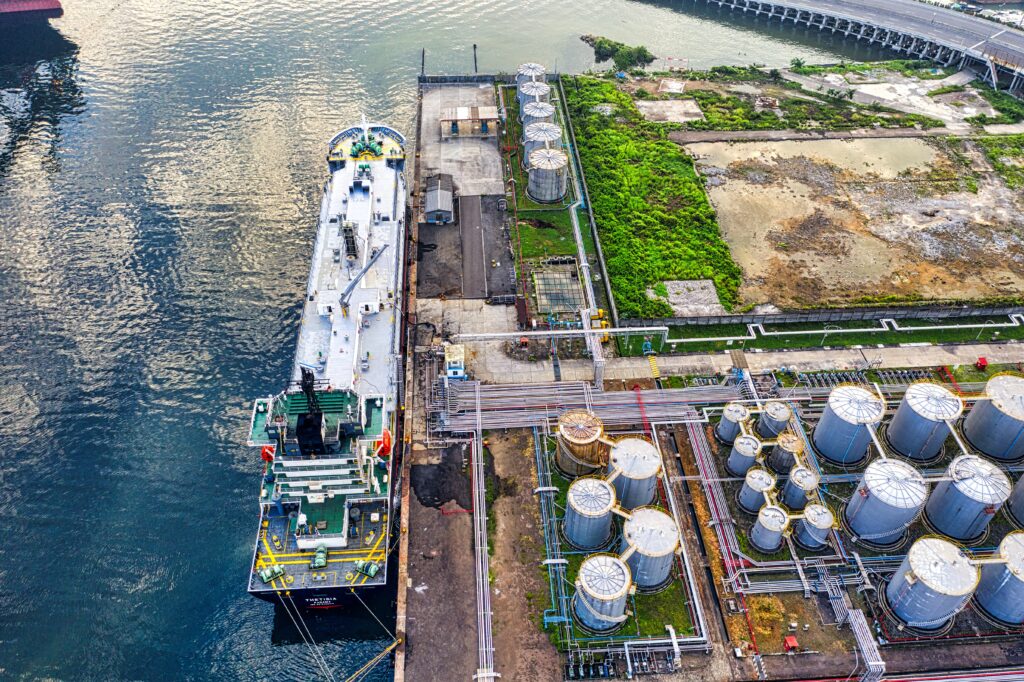Russia is a major producer and exporter of fuel oil and natural gas, and as such, it plays an important role in the global fuel market. Russian oil is well-known for its high quality, low sulfur content, and high yield of important products like gasoline and diesel fuel. Russia is also the second largest producer of natural gas in the world. Siberia and the Far East have a lot of natural gas deposits.
Gazprom Neft and Rosneft, which are both owned by the Russian government, control most of the country’s oil and natural gas production and exports. These companies also run huge refineries and storage facilities where fuel is processed and sent to markets in the United States and around the world.
One of the Russian fuel market’s main advantages is its geographical location, which enables for easy access to major worldwide markets, particularly those in Europe and Asia. Russia also has a well-developed transportation system, which includes pipelines, ports, and railroads, making it easier to move fuel products both domestically and internationally.
Along with oil and natural gas, Russia makes a lot of coal, which is used as a fuel source in power plants and factories. The country also has a strong renewable energy sector, with a lot of room for developing solar and wind power.
Overall, the Russian fuel market is distinguished by its enormous reserves, high-quality products, and strategic location, making it a major player in the global fuel market.
Fuel Watch is a program or project that tracks and reports on fuel prices in a particular region or country. The primary purpose of Fuel Watch is to give consumers with information about current fuel prices, such as gasoline, diesel, and propane, to assist them in making informed decisions about where to purchase fuel.
Contact Us Now to Purchase Russian Fuel
Here are a few issues to consider regarding Fuel Watch and fuel prices:

- Fuel Watch programs often collect data on fuel prices from a range of sources, including fuel retailers and government agencies.
- The information is then used to generate a list or map of current fuel prices, which is made available to the public via a website or mobile app.
- Fuel Watch can assist consumers in saving money by discovering merchants with the lowest fuel prices, as well as in planning their fuel purchase.
- Fuel prices can vary between areas and cities, so it’s important to verify prices before buying fuel. Government policies, such as taxes and subsidies, can also affect the price of fuel for consumers.
- Governments in some countries may regulate fuel prices to keep them reasonable for consumers.
- Fuel Watch programs can benefit both consumers and retailers by allowing retailers to monitor their competitors’ prices and modify their own prices accordingly.
- Overall, Fuel Watch is a beneficial service for consumers because it provides information that might assist them in saving money on fuel. However, it is important to note that the prices recorded by Fuel Watch may not reflect the prices paid by consumers, as shops may offer discounts or specials that are not reflected in the statistics.
You can check details of Fuel Watch Here<<
Russia’s Top 10 Biggest Fuel Refineries include:
- Angarsk Petrochemical Corporation
- Bashneft-Ufaneftekhim
- Gazprom Neft Omsk Refinery
- Gazprom Neft Moscow Refinery
- Lukoil-Nizhny Novgorod Refinery
- Rosneft-Komsomolsk Refinery
- Rosneft-Tuapse
- Tatneft
- Bashneft
- Slavneft
Please keep in mind that this is not an exhaustive list, and there may be other refineries in operation in Russia. The following refineries are described in detail:
- Angarsk Petrochemical Corporation: This refinery was located in 1964 in Angarsk, Russia. It is a subsidiary of Rosneft and one of Russia’s largest oil refineries. The refinery processes crude oil from Eastern Siberia and the Far East and produces a variety of refined products such as gasoline, diesel, jet fuel, and heating oil.
- Bashneft-Ufaneftekhim: A subsidiary of Bashneft, this refinery is located in Ufa, Russia. Built in 1974, the refinery has a refining capacity of 6 million tonnes of oil per year. The refinery processes crude oil from Bashkortostan and neighbouring regions and produces a variety of refined products such as gasoline, diesel, jet fuel, and heating oil.
- Gazprom Neft Omsk Refinery: This refinery is a subsidiary of Gazprom Neft and is located in Omsk, Russia. Built in 1929, the refinery has a refining capacity of 15 million tonnes of oil per year. The refinery produces crude oil from Western Siberia into a variety of refined products such as gasoline, diesel, jet fuel, and heating oil.
- Gazprom Neft Moscow Refinery: This refinery is a subsidiary of Gazprom Neft and is located in Moscow, Russia. Built in 1885, the refinery has a refining capacity of 12 million tonnes of oil per year. The refinery processes crude oil from Western Siberia and the Volga-Urals area and produces gasoline, diesel, jet fuel, and heating oil, among other products.
- Gazprom Neft Noyabrsk Refinery: This refinery is a subsidiary of Gazprom Neft and is located in Noyabrsk, Russia. Built in 1973, the refinery has a refining capacity of 6 million tons of oil per year. The refinery produces crude oil from Western Siberia into a variety of refined products such as gasoline, diesel, jet fuel, and heating oil.
- Lukoil-Nizhny Novgorod Refinery: This refinery is a subsidiary of Lukoil and is located in Nizhny Novgorod, Russia. Built in 1960, the refinery has a refining capacity of 12 million tonnes of oil per year. The refinery processes crude oil from Western Siberia and the Volga-Urals area and produces gasoline, diesel, jet fuel, and heating oil, among other products.
- Rosneft-Komsomolsk Refinery: A subsidiary of Rosneft, this refinery is located in Komsomolsk-on-Amur, Russia. Built in 1957, the refinery has a refining capacity of 10 million tonnes of oil per year. The refinery processes crude oil from Eastern Siberia and the Far East and produces a variety of refined products such as gasoline, diesel, jet fuel, and heating oil.
- Rosneft-Kuibyshev Refinery: A subsidiary of Rosneft, this refinery is located near Samara, Russia. The refinery, which was built in 1962, has a refining capacity of 10 million tonnes of oil per year. The refinery processes crude oil from Western Siberia and the Volga-Urals area and produces gasoline, diesel, jet fuel, and heating oil, among other products.
- Rosneft-Tuapse Refinery: A subsidiary of Rosneft, this refinery is located in Tuapse, Russia. Built in 1933, the refinery has a refining capacity of 7 million tonnes of oil per year. The refinery processes crude oil from the Black Sea and Caspian Sea regions and produces a wide range of refined products like as gasoline, diesel, jet fuel, and heating oil.
- Surgutneftegaz Refinery: This refinery is a subsidiary of Surgutneftegaz and is located in Surgut, Russia. The refinery was built in 1979 and has a refining capacity of 21 million tonnes of oil per year. The refinery produces crude oil from Western Siberia into a variety of refined products such as gasoline, diesel, jet fuel, and heating oil.
- Transneft Refinery: A Russian state-owned enterprise that operates the country’s oil pipeline network. It was founded in 1993 and has its headquarters in Moscow. The corporation is in charge of transporting oil and petroleum products from fields in Western Siberia and the Russian Far East to refineries and export terminals.
With a total length of over 77,000 kilometres, Transneft’s pipeline system is one of the world’s largest. The corporation manages a trunk pipeline network that connects Russia’s key oil production regions to ports on the Baltic, Black, and Caspian Seas, as well as other countries. It also owns and runs several regional pipelines and oil storage facilities. - Tatneft Refinery: This refinery a key actor in Russia’s oil sector, and it owns and manages numerous refineries, including the Almetyevsk Oil Refinery, the Nizhnekamsk Refinery, and the Bugulma Refinery.
- Bashneft Refinery: It is one of the biggest Russian oil corporations that owns and manages many refineries, including the Ufa, Novo-Ufimsky, and Salavat refineries.
- Slavneft Refinery: This refinery manages the Mozyr Refinery in Belarus as a joint venture between Rosneft and Belarus’ state-owned oil business.
Russia’s Largest Fuel Storage Tanks Facilities

Russia has a variety of huge fuel storage stations where various types of fuels such as gasoline, diesel, and jet fuel are stored. Here are some of Russia’s largest fuel storage facilities:
- The Novorossiysk Fuel Oil Terminal: With a storage capacity of around 1.5 million tonnes, this is one of Russia’s largest fuel oil storage facilities. The terminal is located on the Black Sea coast and serves as a significant centre for the export of Russian fuel oil.
- The Ust-Luga Fuel Oil Terminal: Located on the Gulf of Finland, this terminal has a storage capacity of approximately 1 million tonnes. It is also an important hub for the export of Russian fuel oil.
- The Primorsk Fuel Oil Terminal: Located on the Gulf of Finland, this terminal has a storage capacity of around 700,000 tonnes. It is also an important hub for the export of Russian fuel oil.
- The St. Petersburg Fuel Oil Terminal: This is a fuel oil storage facility on the Gulf of Finland with a capacity of approximately 600,000 tonnes.
- The Novosibirsk Fuel Oil Terminal: This is a fuel oil storage facility in the Novosibirsk region with a capacity of around 500,000 tonnes.
- The Surgut Fuel Oil Terminal: Located in the Surgut region, this fuel oil storage facility has a storage capacity of around 400,000 tonnes.
- The Krasnodar Fuel Oil Terminal: Located in the Krasnodar region, this fuel oil storage facility has a storage capacity of around 300,000 tonnes.
In addition to the storage facilities described above, Russia has numerous significant gasoline and diesel Russian fuel storage facilities, including subterranean storage facilities in Urengoy and Yamburg, as well as aboveground storage facilities in the Moscow area.
Special Note Disclaimer: It is important to note that all storage facilities given above are generic in nature and that each storage plant’s capacity may have changed recently or will change in the future. These above given details are to make you understand overall capacity of the facilities
Contact Us Now to Purchase Russian Fuel
Major Benefits of Buying Fuels from Russia:
Russia is one of the biggest producers and exporters of oil and natural gas. Its fuel products are popular with buyers all over the world for a number of reasons. The Russian government and fuel companies may choose to emphasize the following points:
- High-Quality Fuel: Russian oil is well-known for its high quality, with low sulphur content and a high production of important products like gasoline and diesel. This assures that the fuel is clean-burning and efficient, as well as lowering the environmental effect of its use.
- Strategic Location: Russia is strategically located with easy access to major worldwide markets, particularly in Europe and Asia, allowing for efficient and cost-effective distribution of fuel products.
- Reliability: Russian fuel businesses like Gazprom Neft and Rosneft are known for their dependability and commitment to meeting their clients’ needs. Customers will be able to rely on a consistent supply of fuel products as a result of this.
- Low Pricing: Russian fuel firms are able to offer competitive prices for their products, making them an appealing alternative for buyers looking for high-quality fuel at a reasonable price.
- Sustainable Production: Russia is also a big generator of renewable energy, with substantial potential for wind and solar power development. This demonstrates the country’s dedication to sustainable production and lowering its environmental impact.
- Technical Expertise: Russian fuel businesses offer a lot of technical expertise and industry experience that may provide customers wishing to improve their fuel usage with important advice and direction.
“If you are looking for high-quality, reliable, and reasonable Russian fuel prices lower than Russian Fuel Tracker, then there is no need to look any further!” Our Russian fuel products are known for their high quality, low sulfur content, and high production of important products like gasoline and diesel.
Our low prices make us a good choice for people who want to buy high-quality fuel at a fair price. Furthermore, our commitment to sustainable production and our technological competence make us the ideal choice for buyers wishing to optimize their fuel consumption. We can supply through Tank to Tank, Tank to Vessel and Even Through Russian Fuel Pipeline. Don’t pass up this opportunity; choose Russian fuels from our refinery right away! Contact Us Now to Purchase Russian Fuel

FAQs
Q: What are the most frequent types of fuel used to create electricity?
A: Coal, natural gas, and nuclear power are the most frequent types of fuel used to produce electricity.
Q: What are the benefits and drawbacks of using biofuels as a substitute for fossil fuels?
A: Biofuels have the advantage of being renewable and emitting less greenhouse gas than fossil fuels. Disadvantages include higher production costs and possibly being less energy dense than fossil fuels.
Q: How does the price of crude oil effect fuel prices?
A: The crude oil prices is a significant factor influencing fuel prices. When the price of crude oil rises, it usually means higher fuel prices at the pump.
Q: What is the difference between gasoline and diesel fuel?
A: Gasoline is a type of fuel that is commonly found in spark-ignition engines seen in automobiles and light trucks. It is a highly flammable liquid composed of a hydrocarbon combination. Diesel fuel, on the other hand, is a type of fuel that is predominantly utilized in compression-ignition engines, such as those seen in heavy-duty vehicles and buses. It is a liquid like gasoline, except it is less flammable and has a higher energy density.
Q: How does natural gas function as a fuel?
A: Natural gas is a fossil fuel primarily made of methane. It is frequently used as a fuel for both heating houses and buildings and generating power. It is also utilized as a fuel in industrial processes and transportation, as compressed natural gas (CNG) or liquified natural gas (LNG) (LNG)
Q. What are the environmental consequences of using fossil fuels?
A: The combustion of fossil fuels like oil, coal, and natural gas emits carbon dioxide and other pollutants into the atmosphere. Climate change and air pollution are exacerbated by these pollutants. Furthermore, the production and transportation of fossil fuels can harm local communities and ecosystems.
Q: How can we lessen our reliance on fossil fuels?
A: There are numerous options for reducing reliance on fossil fuels. One option is to make buildings and appliances use less energy, such as by making them more energy efficient. Another option is to use renewable energy sources like solar, wind, and waterpower more. Investing in research and development (R&D) for new technologies that can help make fossil fuels less harmful to the environment and encourage the use of greener energy sources can also help.

